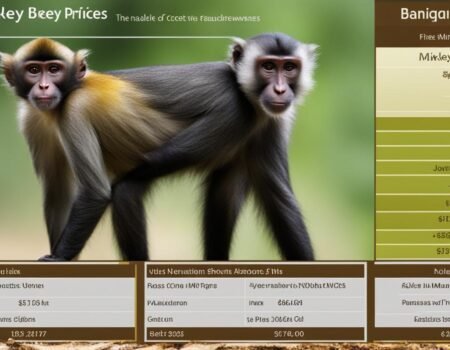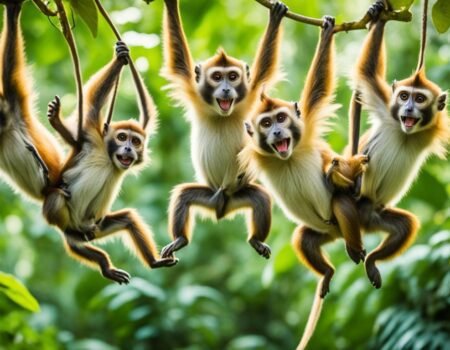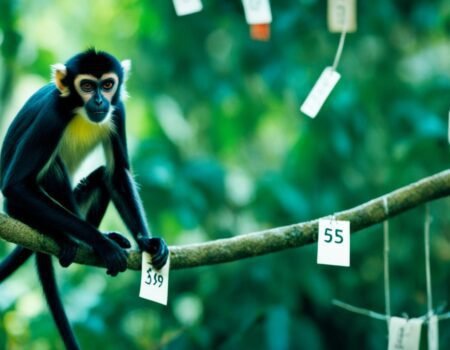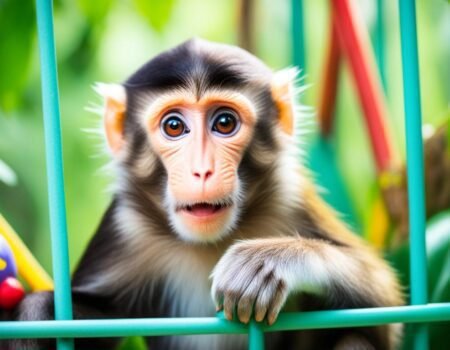Welcome to our ultimate guide on exotic monkey care. Whether you’re a proud owner of a rare primate or considering getting one, this comprehensive guide is here to provide you with all the essential information and tips you need. From understanding their unique characteristics and behaviors to ensuring their health and happiness, we’ve got you covered.
Exotic monkeys, like all primates, require special care and attention. As tropical apes and endangered species, it’s crucial to provide them with the proper environment, diet, and enrichment to thrive. Whether you’re caring for a finger monkey, a subspecies of chimpanzee, or any other unique simian, this guide will equip you with the knowledge to create a safe and fulfilling life for your primate companion.
Throughout the guide, we’ll explore various topics, including the fascinating life of a finger monkey, their adaptability and feeding habits, daily routines, and the challenges of owning a pet monkey. Additionally, we’ll discuss the care and welfare of capuchin monkeys, another popular exotic pet choice.
What is a Finger Monkey?
Finger monkeys, also known as pygmy marmosets, are the smallest species of monkey and one of the tiniest primates in the world. They inhabit the treetops of South American rainforests and have a body length of 4.6 to 6.2 inches, excluding their tails. Females usually weigh over 4 ounces, and males are slightly smaller.
These tiny monkeys have incredible clinging abilities and can even hold onto objects like fingers.
| Primate Species | Body Length (in inches) | Weight (in ounces) |
|---|---|---|
| Finger Monkey (Pygmy Marmoset) | 4.6-6.2 (excluding tail) | Females: >4, Males: slightly smaller |
| Marmoset Monkey | 6-12 (excluding tail) | 8-12 |
| Tamarins | 7-13 (excluding tail) | 10-15 |
| Squirrel Monkey | 9-14 (excluding tail) | 17-31 |
| Capuchin Monkey | 13-22 (excluding tail) | 2.5-6.5 pounds |
| Spider Monkey | 15-24 (excluding tail) | 15-25 pounds |
As shown in the table, finger monkeys (pygmy marmosets) are the smallest monkey species, highlighting their unique size and significance in the primate world.
The Fascinating Life of a Finger Monkey
Finger monkeys, also known as pygmy marmosets, are social animals that thrive in small groups. These groups typically consist of an adult male, an adult female, and their offspring. Group sizes can vary from two to ten individuals, depending on factors such as habitat availability and resource availability.
One intriguing aspect of finger monkey behavior is their monogamous nature. These monkeys form lifelong pair bonds, with the male and female mating exclusively with each other. In some cases, additional males may also be part of the group, helping with the care of newborns and providing support to the family unit.
“Finger monkeys exhibit a cooperative nature within their groups, with all members contributing to the care and well-being of the offspring,” says Dr. Jane Evans, a primatologist specializing in primate behavior. “This cooperative behavior ensures the survival and success of the group as a whole.”
Female finger monkeys give birth twice a year, with the males playing a crucial role in rearing the young. They are actively involved in carrying and grooming the infants, ensuring their protection and growth. This shared parental care strengthens the bonds within the group and contributes to the survival of the species.
In their natural habitat, finger monkeys have an average lifespan of 12-16 years. However, their lifespan can vary depending on factors such as predation, disease, and habitat conditions. In captivity, where they are protected from many natural threats, finger monkeys can live between 15-22 years on average.
To provide a visual representation of the fascinating social structure of finger monkey groups, here is a table summarizing their group dynamics:
| Group Size | Composition |
|---|---|
| 2-10 individuals | Adult male Adult female Offspring |
Adaptability and Feeding Habits
Finger monkeys, also known as pygmy marmosets, are exceptional climbers and possess unique feeding abilities. Their remarkable agility and dexterity make them exceptional tree-dwellers. With their long, sharp nails that resemble claws, finger monkeys effortlessly grasp tree branches, showcasing their incredible climbing abilities.
Feeding primarily on the sap, resin, gum, and vines found on trees, finger monkeys also supplement their diet with a variety of prey such as insects, butterflies, spiders, and fruits. Their feeding habits are diverse and adaptable to the available resources in their environment, showcasing their remarkable feeding abilities.
“Finger monkeys are exceptional climbers, and their unique feeding abilities make them highly adaptable primates in their natural habitat.”
These small primates possess a variety of tactics to evade predators in their natural environment. When threatened by snakes, cats, or raptors, finger monkeys rely on their exceptional leaping skills, vocalizations, group defenses, and the ability to freeze in place. Their quick thinking and agile movements allow them to evade danger and survive in the face of predators.
Overall, finger monkeys’ climbing abilities, feeding abilities, and unique nails enable them to adapt and thrive in their natural habitats. Their exceptional skills and tactics help them secure their place in the complex ecosystem of the rainforests.
The Daily Life of a Finger Monkey
Finger monkeys, also known as pygmy marmosets, are diurnal creatures. This means they are active during the day, engaging in various activities that contribute to their overall well-being.
Feeding: Finger monkeys have a keen sense of taste and enjoy a diverse diet. They primarily feed on sap, resin, gum, vines, insects, butterflies, spiders, and fruits. Their unique nails, resembling claws, allow them to grip tree branches while foraging for food.
Foraging: These tiny primates spend a significant amount of time foraging for their meals. They use their exceptional climbing abilities to search for food in the treetops of South American rainforests. Their agility and small size give them an advantage in reaching otherwise inaccessible food sources.
Grooming: Finger monkeys are meticulous groomers. They use their nimble fingers to pick through their fur, ensuring it is clean and tangle-free. Grooming not only helps maintain their appearance but also strengthens social bonds within the group.
Playing: Finger monkeys are playful creatures. They engage in various interactive behaviors, such as chasing, wrestling, and mimicry. Play is an essential aspect of their development, promoting physical coordination and social integration with other members of their group.
Finger Monkey Daily Routine
| Activity | Time |
|---|---|
| Feeding | Morning and late afternoon |
| Foraging | Throughout the day |
| Grooming | Intermittently throughout the day |
| Playing | Throughout the day |
| Sleeping | Nighttime, after the second feeding |
Sleeping area: After their second feeding, finger monkey groups retreat to a sleeping area or roost. These sleeping areas are typically composed of bundles of vines or tree holes that provide a safe and cozy resting place for the night.
Finger monkeys lead active and engaging lives, exploring their environment, socializing with their group, and thriving in their natural habitat. Understanding their daily routine helps us appreciate the unique behaviors and needs of these fascinating primates.
Are Finger Monkeys Suitable as Pets?
Before considering finger monkeys as pets, it is crucial to research the legality of owning primates or monkeys in your state or country. Many places outright prohibit private ownership, while others may require permits or licenses.
Aside from the legal considerations, potential pet owners should be aware of the challenges and responsibilities that come with owning a finger monkey. Responsible ownership involves providing proper care, meeting dietary requirements, creating appropriate captivity conditions, and understanding their social and behavioral needs.
Legal Considerations and Pet Ownership Regulations
When it comes to owning finger monkeys, the legality of ownership varies depending on your location. It is essential to thoroughly research and comply with the pet ownership regulations in your state or country.
“Proper care, meeting dietary requirements, creating appropriate captivity conditions, and understanding their social and behavioral needs are crucial for responsible ownership of finger monkeys.”
Challenges of Owning Finger Monkeys
While finger monkeys are undeniably adorable, they present unique challenges as pets. These challenges include their high energy levels, their need for mental stimulation, and their social nature. Finger monkeys thrive when they have ample social interaction and engaging activities to keep them mentally and physically stimulated.
Responsible Ownership and Captivity Conditions
Responsible ownership of finger monkeys entails meeting their dietary needs, providing a safe and suitable environment, and ensuring they receive proper veterinary care. Finger monkeys require a diet that includes fruits, insects, and other suitable food sources. Their captivity conditions should replicate their natural habitat as closely as possible to ensure their health and well-being.
By understanding the legality of ownership, considering the challenges, and ensuring responsible ownership with proper captivity conditions, you can provide a happy and fulfilling life for your finger monkey companion.
What to Consider Before Getting a Pet Monkey
Owning a pet monkey is a huge commitment that requires time, attention, and resources. Before welcoming one into your home, it’s essential to carefully consider several factors.
Research Different Monkey Species
There are various monkey species with different characteristics and care requirements. Some monkeys may be more suitable as pets than others. Take the time to research and understand the specific needs of the monkey species you are interested in. Consider factors such as their size, social behavior, and dietary preferences.
Long-Term Care Responsibilities
Monkeys are long-lived creatures that can live for several decades. Before bringing a pet monkey into your home, it’s crucial to be prepared for the long-term care responsibilities involved. Ensure that you can provide the necessary care, attention, and resources for the entire lifespan of the monkey.
Meeting Health and Happiness Needs
Monkeys have specific health and happiness needs that must be met in order for them to thrive. They require a balanced diet, regular exercise, mental stimulation, and social interaction. It’s important to assess whether you can fulfill these needs and provide a suitable environment for the monkey to live a happy and fulfilled life.
Legal Regulations
It is vital to understand the legal regulations regarding monkey ownership in your location. Some areas have strict regulations or outright prohibit keeping monkeys as pets. Research and comply with the applicable laws and regulations to ensure that you are legally allowed to own a pet monkey.
Comparison of Monkey Species Suitability as Pets
| Monkey Species | Size | Social Behavior | Care Requirements |
|---|---|---|---|
| Capuchin Monkey | Small to medium | Social | High |
| Finger Monkey | Smallest | Social | Moderate |
| Macaque Monkey | Medium to large | Varies by species | High |
“Owning a pet monkey requires a significant commitment of time, attention, and resources. It’s crucial to thoroughly research and understand the specific needs of the monkey species you are interested in before making the decision to bring one into your home.” – Monkey Expert
Considering all these factors and doing proper research before getting a pet monkey will help ensure that you can provide the necessary care and the best possible environment for your new furry friend.
Monkey-Proofing Your Home
When it comes to having a pet monkey, ensuring their safety and the security of your home is of utmost importance. Monkeys are naturally curious and intelligent creatures that can easily get into anything within their reach. To provide a safe environment for your pet, it’s crucial to take the necessary steps to monkey-proof your home.
Identifying Household Hazards
Before bringing a pet monkey into your home, it’s essential to assess any potential hazards. Some common household hazards that should be addressed include:
- Electrical cords: Monkeys are known for their curiosity and may be tempted to chew on electrical cords, posing a risk of electric shock or injury. Ensure that all cords are properly managed and secured out of your pet’s reach.
- Fragile items: Monkeys are agile and may accidentally knock over fragile items such as vases, lamps, or decorative objects. Consider securing these items or relocating them to prevent any accidents.
- Toxic substances: Like any other pet, monkeys should be kept away from toxic substances such as cleaning supplies, pesticides, or certain houseplants that can be harmful if ingested. Store these items safely in secure cabinets or high shelves.
Creating Secure Enclosures
“Creating a safe and secure enclosure for your pet monkey is crucial.” – Pet Safety Experts
Monkeys need ample space to move and explore, but it’s essential to designate secure enclosures where they can safely spend their time. This offers them a sense of security and prevents them from wandering into areas that may pose a risk. Constructing a well-designed enclosure or play area will maximize your pet’s safety and minimize the chances of accidents or escape.
Designating Monkey Play Areas
To stimulate your pet monkey and provide them with a dedicated space for play and exercise, it’s beneficial to designate specific monkey play areas within your home. These areas should be free from hazards and have engaging toys or climbing structures to keep your furry friend entertained while reducing the likelihood of them venturing into potentially dangerous areas.
| Hazards | Solutions |
|---|---|
| Electrical cords | Secure cords out of reach or use cord management solutions |
| Fragile items | Secure or remove fragile items from your pet’s reach |
| Toxic substances | Store toxic substances securely, out of your pet’s reach |
By implementing these measures, you can ensure the safety of both your pet monkey and your household. Remember, monkey-proofing your home requires ongoing vigilance and attention to detail. Regularly inspect your living space for any potential hazards or changes that may require adjustments to ensure a safe and enjoyable environment for your beloved pet.
The Care and Welfare of Capuchin Monkeys
Capuchin monkeys are energetic and intelligent animals that require ample physical and mental stimulation. Due to their specific needs and behavior difficulties, owning a capuchin monkey as an exotic pet is often considered unethical. It is crucial to research and follow legal regulations regarding the ownership of these monkeys. Providing proper care, including a suitable enclosure, a varied diet, and regular veterinary care, is essential for their well-being.
“Capuchin monkeys are highly intelligent and require a stimulating environment to thrive.”
The Plight of Captive Capuchin Monkeys
Capuchin monkeys are native to Central and South America, where they live in complex social groups and engage in sophisticated behaviors. Unfortunately, the exotic pet trade has led to the capture and confinement of these intelligent creatures. Their captivity often results in physical and psychological distress, as they are deprived of critical social interactions and their natural environment.
Legal Regulations and Ethical Concerns
Many countries and states have strict regulations regarding the ownership of capuchin monkeys as pets. These regulations are in place to protect both the monkeys and the public. Before considering a capuchin monkey as a pet, it is important to thoroughly research the legal requirements in your area. Additionally, ethical concerns surrounding the exotic pet trade, conservation issues, and the welfare of individual monkeys should be carefully considered.
Behavior Difficulties and Social Needs
Capuchin monkeys are highly social animals that thrive in the company of their own species. When kept as pets, they may experience loneliness and exhibit behavior difficulties such as aggression, self-destructive behaviors, and excessive vocalization. Providing an appropriate social environment and ample mental stimulation can help mitigate these challenges and promote the well-being of the monkey.
Physical and Mental Stimulation
Capuchin monkeys have a natural curiosity and need physical and mental stimulation to prevent boredom and frustration. Enriching their environment with toys, puzzles, and opportunities for exploration can help satisfy their intelligent and active nature. Interacting with their caregivers through play and training sessions also provides important mental stimulation.
Proper Diet and Veterinary Care
A balanced diet is essential for the health of capuchin monkeys. Their diet should consist of a variety of fresh fruits, vegetables, nuts, and protein sources, tailored to their specific nutritional needs. Regular veterinary care, including check-ups and vaccinations, is crucial to monitor their overall health and detect any potential health issues early on.
| Key Considerations for Capuchin Monkey Care | Benefits | Challenges |
|---|---|---|
| Providing a suitable enclosure | – Allows monkeys to engage in natural behaviors – Provides a safe and secure environment |
– Requires space and proper maintenance – Initial setup costs |
| Offering a varied diet | – Promotes overall health and well-being – Provides essential nutrients |
– Requires careful planning and preparation – Additional cost for high-quality food |
| Ensuring regular veterinary care | – Early detection and treatment of health issues – Increases lifespan |
– Veterinary expenses – Finding a specialized exotic animal veterinarian |
Can Capuchin Monkeys Make Good Pets?
Capuchin monkeys are fascinating creatures known for their intelligence and social nature. However, owning a capuchin monkey as a pet comes with its own set of challenges. While they may be adorable and charming as babies, capuchins can develop behavioral issues as they mature. These monkeys have a territorial nature and can become easily bored, leading to destructive behaviors and even aggression.
Capuchins require ample space, both indoors and outdoors, to thrive. They are highly active and need physical activity and mental stimulation on a daily basis. Providing them with an enriched environment, including climbing trees, toys, and puzzles, is essential to keep them happy and healthy.
Another factor to consider when contemplating capuchin monkeys as pets is their susceptibility to diseases. Like any wild animal, capuchins can carry viruses and infections that can be transmitted to humans. It is important to take precautions and practice good hygiene when interacting with them.
In addition to the challenges mentioned, ownership of capuchin monkeys raises ethical concerns. These creatures have complex needs and behaviors that are difficult to meet in a domestic setting. Keeping capuchin monkeys as pets may not be in their best interest. They require social interactions with their own kind and the opportunity to exhibit their natural behaviors in a suitable environment.
In summary, capuchin monkeys are not recommended as pets due to their challenges and the ethical concerns surrounding their ownership. Providing for their territorial and social nature, need for ample space and stimulation, and addressing their behavioral issues can be demanding. Moreover, their susceptibility to diseases and their complex needs make it difficult to provide them with the care they require to thrive. It is best to admire these fascinating creatures in their natural habitats or reputable sanctuaries where their welfare can be ensured.
| Challenges | Territorial and Social Nature | Need for Space and Stimulation | Behavioral Issues | Diseases | Lifespan |
|---|---|---|---|---|---|
| Capuchin monkeys as pets come with unique challenges. | These monkeys have a territorial nature and can become aggressive. | Capuchins require ample space and stimulation to thrive. | They can develop behavioral issues, including destructive behaviors. | Capuchins are prone to diseases that can be transmitted to humans. | The lifespan of capuchin monkeys is around 20-40 years. |
Finding a Reputable Monkey Breeder
If you’re considering the purchase of a pet monkey, it’s essential to find a reputable breeder who prioritizes the welfare of these animals. A reputable breeder should have a valid USDA permit and a track record of providing proper care to their monkeys.
When searching for a breeder, it’s crucial to ensure that they are not involved in illegal trade or unethical practices. By taking these precautions, you can help prevent the exploitation and mistreatment of monkeys in the pet industry.
By purchasing a pet monkey from a reputable breeder, you not only support responsible breeding practices but also contribute to the prevention of illegal trade in the animal industry. Remember, the well-being of these fascinating creatures should always be a top priority when exploring the possibility of pet monkey ownership.
FAQ
What is a Finger Monkey?
Finger monkeys, also known as pygmy marmosets, are the smallest species of monkey and one of the tiniest primates in the world. They inhabit the treetops of South American rainforests and have a body length of 4.6 to 6.2 inches, excluding their tails.
What is the lifespan of a finger monkey?
In their natural habitat, finger monkeys have an average lifespan of 12-16 years, while those in captivity can live between 15-22 years.
What do finger monkeys eat?
Finger monkeys feed on sap, resin, gum, and vines from trees, supplemented by insects, butterflies, spiders, and fruits.
Are finger monkeys social animals?
Yes, finger monkeys are social animals that live in small groups consisting of an adult male, an adult female, and their offspring.
Are finger monkeys suitable as pets?
Before considering finger monkeys as pets, it is crucial to research the legality of owning primates or monkeys in your state or country. Many places outright prohibit private ownership, while others may require permits or licenses. Apart from legal considerations, potential pet owners should be aware of the challenges and responsibilities of owning a finger monkey.
Can capuchin monkeys make good pets?
Capuchin monkeys are energetic and intelligent animals that require ample physical and mental stimulation. Due to their specific needs and behavior difficulties, owning a capuchin monkey as an exotic pet is often considered unethical.
What should I consider before getting a pet monkey?
Potential owners should research different monkey species to understand their characteristics and care requirements. It is important to be prepared for the long-term care responsibilities involved, as monkeys can live for several decades. Additionally, checking the legal regulations regarding monkey ownership in your location is crucial before bringing one into your home.
How can I monkey-proof my home?
Monkey-proofing your home is essential to ensure the safety of both your pet monkey and your belongings. Monkeys are curious and intelligent creatures that can get into everything. Removing potential hazards such as cords, fragile items, and toxic substances, as well as securing enclosures and designated monkey play areas, can help create a safe environment for your pet.
What should I know about the care and welfare of capuchin monkeys?
Capuchin monkeys have complex needs and behaviors and often require ample space, physical activity, and mental stimulation to thrive. Additionally, they are prone to certain diseases that can be transmitted to humans. Considering the challenges and ethical concerns associated with keeping capuchin monkeys, they are not recommended as pets.
How can I find a reputable monkey breeder?
If one decides to purchase a pet monkey from a breeder, it is crucial to find a reputable one who prioritizes the welfare of the animals. Reputable breeders should possess a USDA permit and have a history of providing proper care to their monkeys.










No Comment! Be the first one.